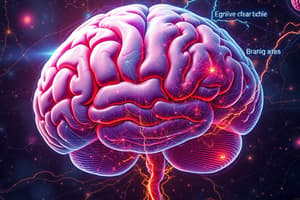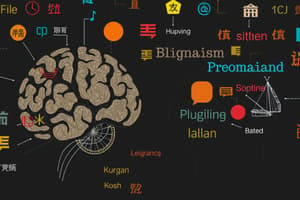Podcast
Questions and Answers
What is the significance of contemporary neuroimaging techniques in studying language organization in the brain?
What is the significance of contemporary neuroimaging techniques in studying language organization in the brain?
- They have enlarged our view of language organization in the brain. (correct)
- They have completely replaced aphasia lesion localization techniques.
- They have shown that language organization in the brain is limited to a few specific areas.
- They have confirmed the findings of Paul Broca in the 19th century.
What did Paul Broca contribute to the understanding of language representation in the human brain?
What did Paul Broca contribute to the understanding of language representation in the human brain?
- Discovered the specific brain region responsible for language processing.
- Introduced functional connectivity analyses for brain research.
- Developed advanced structural imaging techniques.
- Initiated aphasia lesion localization in the 19th century. (correct)
What do functional neuroimaging techniques such as fMRI and PET allow researchers to do?
What do functional neuroimaging techniques such as fMRI and PET allow researchers to do?
- Measure lesion localization after brain injury.
- Replace the need for structural imaging techniques.
- Track the conjoined activation of several brain regions in healthy people.
- Observe brain activity in areas active during language use. (correct)
What is the purpose of using DTI (Diffusion Tensor Imaging) in studying language organization in the brain?
What is the purpose of using DTI (Diffusion Tensor Imaging) in studying language organization in the brain?
What has advanced structural imaging techniques using high resolution fMRI allowed researchers to do?
What has advanced structural imaging techniques using high resolution fMRI allowed researchers to do?
Flashcards are hidden until you start studying




